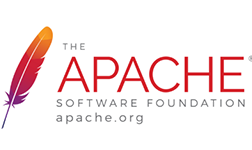
Apache Software Foundation Initiatives to Fuel the Next 25 Years of Open Source Innovation
WILMINGTON, Del., Sept. 19, 2024 — The Apache Software Foundation (ASF), the all-volunteer developers, stewards, and incubators of more than 320 active open source projects and initiatives, has released its annual report for the 2024 fiscal year that ended April 30, 2024. The report is downloadable here.
 “The technology industry is facing changes with forthcoming government regulations for open source and disruptive technologies like generative AI. And these changes highlight the need for leading open source organizations like the ASF to stay vigilant and responsive to market demands,” said David Nalley, ASF President. “This past fiscal year the ASF proved its ability to evolve while remaining steadfast in its mission to provide open source software for the public good.”
“The technology industry is facing changes with forthcoming government regulations for open source and disruptive technologies like generative AI. And these changes highlight the need for leading open source organizations like the ASF to stay vigilant and responsive to market demands,” said David Nalley, ASF President. “This past fiscal year the ASF proved its ability to evolve while remaining steadfast in its mission to provide open source software for the public good.”
The ASF celebrated its 25th anniversary on March 24, 2024. For more than two decades the ASF has led innovation in open source, pioneering industry standards including licensing and security to deliver software the world relies on – all powered by communities steeped in the Apache Way.
FY24 Highlights
- The ASF submitted a response to the White House Office of the National Cyber Director (ONCD) Request for Information (RFI) on “Open-Source Software Security and Memory Safe Programming Languages.” The ASF offered considerable advice to policy makers of the EU to help define open source security best practices.
- The ASF joined the Open Regulatory Compliance Working Group to address the multifaceted challenges of cybersecurity in the open source ecosystem, and to demonstrate its collective commitment to cooperate with and implement the CRA.
- The ASF Legal committee created documentation to provide the ASF and its open source communities with guidance on how to navigate usage of rising technologies like artificial intelligence (AI).
The ASF helped increase developer productivity by welcoming Gradle as an ASF targeted sponsor and enabling ASF open source projects to access Develocity (formerly Gradle Enterprise) as part of ASF’s infrastructure service. ASF projects currently leveraging Develocity for weekly builds include Apache Beam, Apache Kafka, Apache Lucene, and Apache Pulsar. - 5 projects graduated to become a Top-Level Project (TLP): Celeborn, KVRocks, Paimon, Pekko, and SeaTunnel.
The 2023 State of Diversity and Inclusion in the ASF Community report demonstrated that people feel welcome and included, and that they have an equal chance of getting their contributions accepted. - ASF projects serve the public good with use cases such as fueling cancer research; aiding in clean energy research; and reducing food waste. Apache Superset, Apache Airflow, Apache Storm, Apache IoTDB are among the examples.
- 7 new projects were added to the ASF Incubator program: Apache Answer, Apache Amoro, Apache GraphAr, Apache HertzBeat, Apache HoraeDB, Apache ResilientDB, Apache StormCrawler
- 4 projects were added to the Apache Attic: Apache Any23, Apache Giraph, Apache MXNet, and Apache OODT.
FY24 Numbers At-A-Glance
- 1,105 members who demonstrate a sustained commitment to the ASF and its projects by contributing work to them.
- 70 sponsors supporting open source innovation at the ASF.
- 8,400 committers worked across 320+ projects.
- 208 committees provided support and guidance for ASF projects.
- 869 software releases were issued across ASF projects.
- 30 incubating podlings are currently working towards becoming an ASF TLP.
Download the ASF FY2024 report here.
About the Apache Software Foundation
Founded in 1999, the Apache Software Foundation exists to provide software for the public good with support from more than 70 sponsors. ASF’s open source software is used ubiquitously around the world with more than 8,400 committers contributing to 320+ active projects, including Apache Superset, Apache Camel, Apache Flink, Apache HTTP Server, Apache Kafka, and Apache Airflow. The Foundation’s open source projects and community practices are considered industry standards, including the widely adopted Apache License 2.0, the podling incubation process, and a consensus-driven decision model that enables projects to build strong communities and thrive.
Source: Apache Software Foundation



























